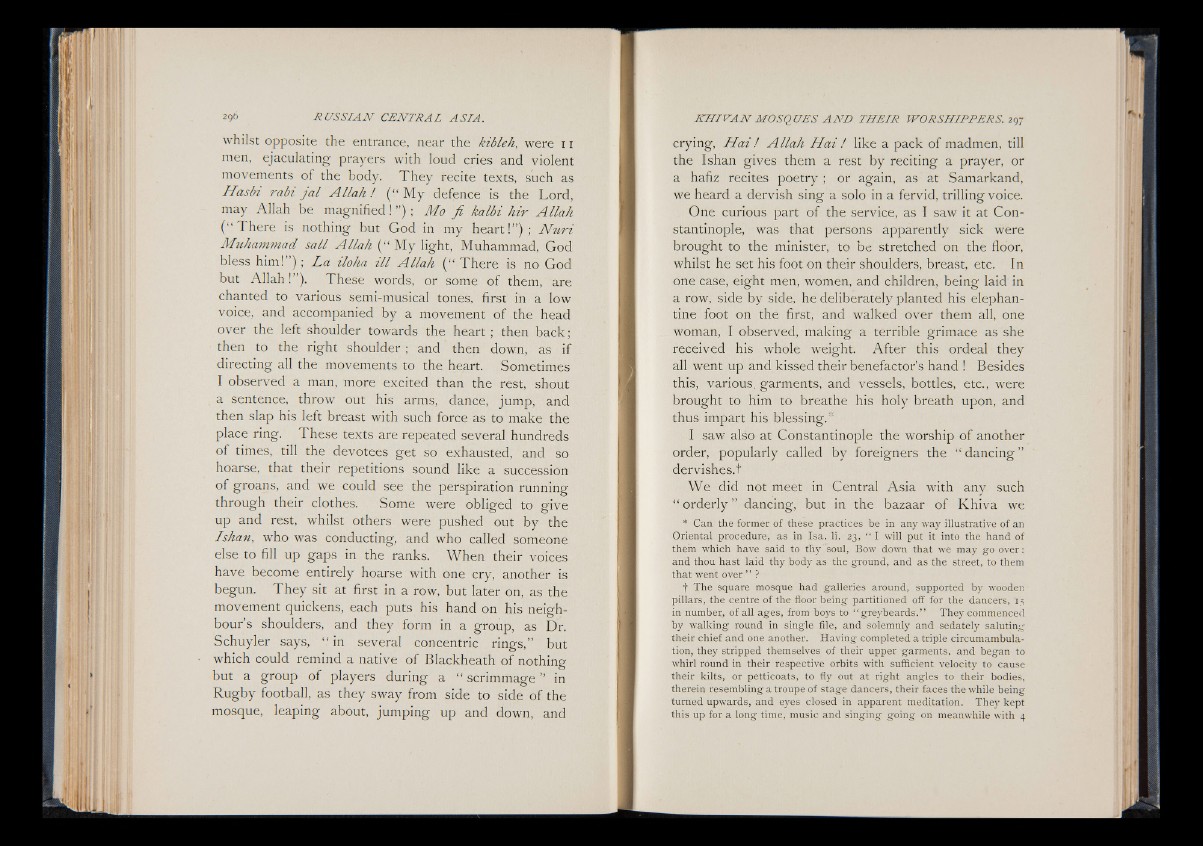
whilst opposite the entrance, near the kibleh, were 11
men, ejaculating prayers with loud cries and violent
movements of the body. T hey recite texts, such as
Hasbi rabi ja l A lla h ! (“ My defence is the Lord,
may Allah be magnified! ”) ; Mo f i kalbi h ir A lla h
(“ There is nothing but God in my heart!”) ; N u r i
Muhammad sail A lla h ( “ My light, Muhammad, God
bless him!” ) ; L a iloha i l l A lla h ( “ There is no God
but Allah !” ). These words, or some of them, are
chanted to various semi-musical tones, first in a low
voice, and accompanied by a movement of the head
over the left shoulder towards the heart ; then back;
then to the right shoulder; and then down, as if
directing all the movements to the heart. Sometimes
I observed a man, more excited than the rest, shout
a sentence, throw out his arms, dance, jump, and
then slap his left breast with such force as to make the
place ring. These texts are repeated several hundreds
of times, till the devotees get so exhausted, and so
hoarse, that their repetitions sound like a succession
of groans, and we could see the perspiration running
through their clothes. Some were obliged to give
up and rest, whilst others were pushed out by the
Ishan, who was conducting, and who called someone
else to fill up gaps in the ranks. When their voices
have become entirely hoarse with one cry, another is
begun. T h e y sit at first in a row, but later on, as the
movement quickens, each puts his hand on his neighbour’s
shoulders, and they form in a group, as Dr.
Schuyler says, “ in several concentric rings,” but
which could remind a native of Blackheath of nothing
but a group of players during a “ scrimmage ” in
Rugby football, as they sway from side to side of the
mosque, leaping about, jumping up and down, and
crying, H a i l A lla h H a i ! like a pack of madmen, till
the Ishan gives them a rest by reciting a prayer, or
a hafiz recites poetry ; or again, as at Samarkand,
we heard a dervish sing a solo in a fervid, trilling voice.
One curious part of the service, as I saw it at Constantinople,
was that persons apparently sick were
brought to the minister, to be stretched on the floor,
whilst he set his foot on their shoulders, breast, etc. In
one case, eight men, women, and children, being laid in
a row, side by side, he deliberately planted his elephantine
foot on thé first, and walked over them all, one
woman, I observed, making a terrible grimace as she
received his whole weight. After this ordeal they
all went up and kissed their benefactor’s hand ! Besides
this, various, garments, and vessels, bottles, etc., were
brought to him to breathe his holy breath upon, and
thus impart his blessing."
I saw also at Constantinople the worship of another
order, popularly called by foreigners the “ dancing”
dervishes.t
We did not meet in Central Asia with any such
“ orderly ” dancing, but in the bazaar of Khiva we
* Can the former of these practices be in any way illustrative of an
Oriental procedure, as in Isa. li. 23, “ I will put it into the hand of
them which have said to thy soul, Bow down that wè may go over :
and thou hast laid thy body as the ground, and as the street, to them
that went over ” ?
f The square mosque had galleries around, supported by wooden
pillars, the centre of the floor being partitioned off for the dancers, 15
in number, of all ages, from boys to “ greybeards.” They commenced
by walking round in single file, and solemnly and sedately saluting
their chief and one another. Having completed a triple circumambulation,
they stripped themselves of their upper garments, and began to
whirl round in their respective orbits with sufficient velocity to cause
their kilts, or petticoats, to fly out at right angles to their bodies,
therein resembling a troupe of stage dancers, their faces the while being
turned upwards, and eyes closed in apparent meditation. The}'' kept
this up for a long time, music and singing going on meanwhile with 4